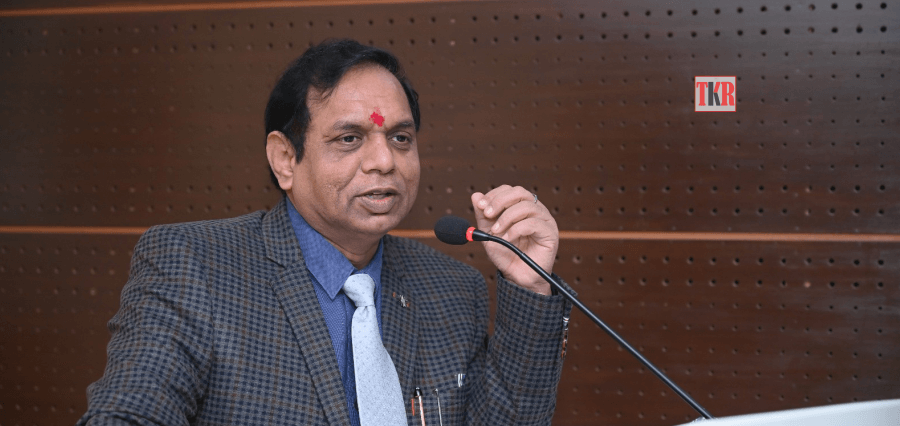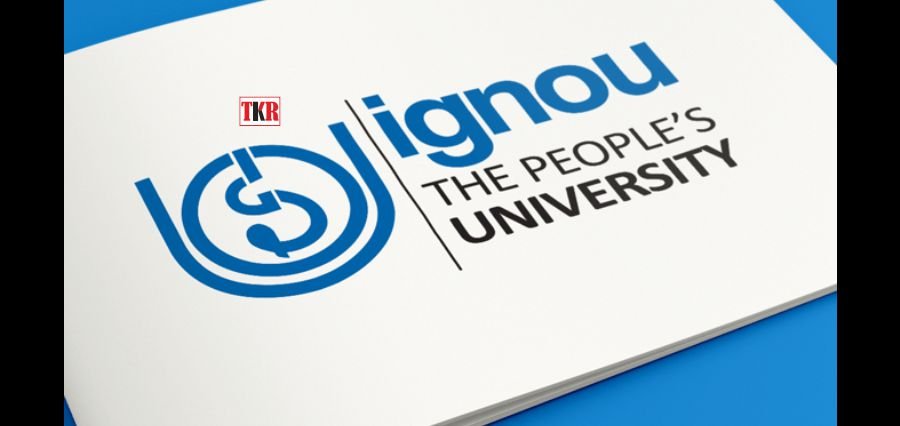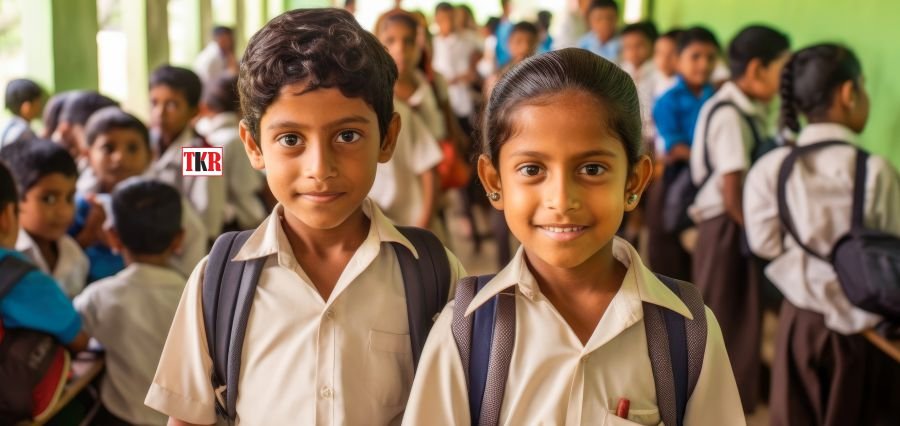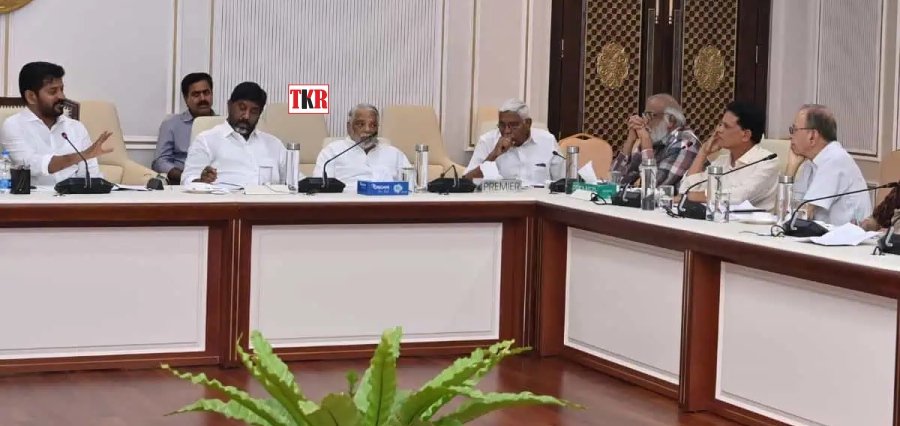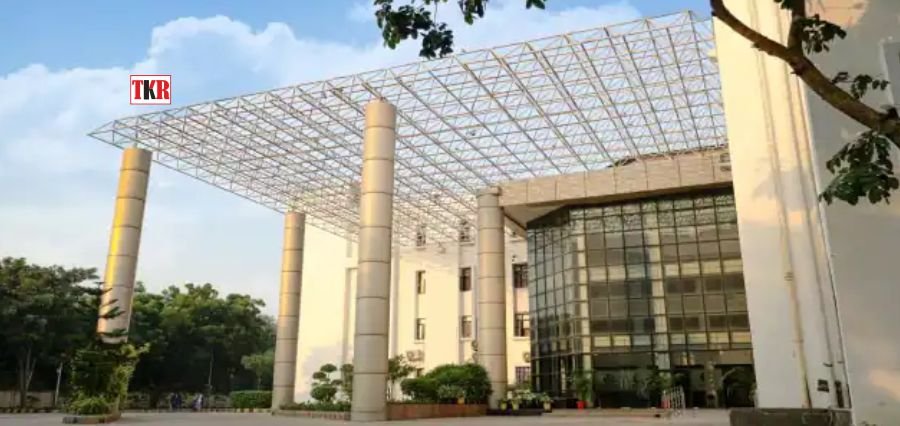Learning isn’t just about academics; it’s also about the all-around development of mental and physical abilities. Teaching students how to manage their emotions, show empathy, and build positive relationships sets them up for success both in and out of the classroom.
To achieve this goal, Prof. Alok Kumar Chakrawal, the Vice-Chancellor of Guru Ghasidas Vishwavidyalaya, has transformed the teaching philosophy to align with students’ psychology.
Since his childhood, Prof. Alok dreamt of being a teacher. In the process, he became an educator and academic administrator. Apart from his parents, he was inspired by many, especially his teachers during high school and college, who instilled in him the spirit to be an educator and make the changes in the world he wanted to see. The pursuit of education to transform laymen into skilled individuals and learned individuals into complete personalities has been the motivating factor behind his selection of education as a career.
Making Teaching-learning Process Engaging
Teaching philosophy constitutes a psychological process whereby the teacher needs to understand the students first before engaging them in the teaching-learning process. There are several moments where Prof. Alok realized that his teaching philosophy had to be transformed to align with the student’s psychology.
Their ‘mental mapping’ remains the core thrust of his teaching philosophy. For instance, one of his students was more interested in starting his own business instead of paying dedicated attention to his studies. It was a satisfying opportunity for Prof. Alok to guide him in initiating his start-up, and today, the student is a successful businessman with a sizeable net worth.
Adapting Innovative Strategies
Prof. Alok emphasizes the reciprocal nature of teaching and learning, particularly in the context of the pandemic, which has necessitated a significant shift in the education landscape. He highlights the need for teachers to adapt their pedagogical approaches to remote learning and to effectively manage their time to cater to student needs and administrative requirements. In response to these challenges, he has developed strategies such as organizing online classes through ICT platforms at flexible times for students and dedicating daytime hours to student interaction and administrative tasks. Prof. Chakrawal’s insights have been shared in various academic forums and reflect his proactive approach to addressing the evolving demands of the education sector.
Prof. Alok has implemented innovative teaching practices like student engagement through mental mapping to promote a culture of innovation and creativity for better academic outcomes. He also aims to instill a problem-solving mindset. Prof. Alok has adopted strategies like virtual learning, flipping classrooms, personalized learning, and project-based learning to inculcate the best among the students for a better outcome during the pandemic. The Jigsaw method of teaching, where a student teaches another student, was adopted during the pandemic as a stress-relieving strategy and to develop deeper interaction among them.
Fostering a Culture of Inclusion
Prof. Alok believes that Diversity, Equity, and Inclusion (DEI) is itself a journey; it can’t be a destination or a finishing line but a continuous yearning for lasting and real improvement. In an environment of immense diversity like India, the job of a teacher in ensuring DEI becomes even tougher.
As a teacher, Prof. Alok has always taken the humanist path beyond ideological bigots and guided his students in the right direction. For him, a society is like a chain, and for a chain to be healthy and strong, every part of it needs to be strong. Likewise, every individual has to be strong if society has to be sound, strong, and coherent. This “Idea of Chain” philosophy with his students to arouse human values in them and to be good, pleasant, and benevolent to all.
Molding Careers through Mind Mapping
Prof. Alok Kumar Chakrawal has a deep-rooted passion for teaching and considers himself a teacher first and foremost. He believes that the greatest accomplishment as a teacher is to help students help themselves and mold their careers through mind mapping. Prof. Chakrawal prioritizes being a “wholesome” teacher for his students, living their lives, dreaming of their aspirations, and working towards their outcomes.
He has shared his expertise in various academic forums, including as a guest speaker at a national-level webinar on ‘Excellence in Teaching in Higher Education Institutions’ organized by Kashmir University’s UGC-Human Resource Development Centre (HRDC).
Virtual learning mode, which started during the pandemic, has also extended into classrooms after the pandemic. The use of ICT tools for presentation in classes, students’ seminars, and interactions during formative assessment has aided both students and teachers in garnering maximum attention and fostering active discussions.
ICT has allowed students to collaborate on different assignments with the help of Google Meet/Google Classroom and Zoom platforms. The incorporation of audio-visual lectures in smart classrooms has enabled students to showcase their best, facilitating the realization of optimal attention for their presentations.
The Lifelong Pursuit of Knowledge
Prof. Alok believes that learning, like the pursuit of knowledge, is a lifelong process. It is a continual habit for both personal and professional development. For an educator, learning is perhaps the most rewarding satisfaction. Since the method of education is changing from the reliance upon traditional classroom to remote learning and blended mode of teaching, teachers, irrespective of their age and levels, need to know the art of disseminating education and to adjust to the changing teaching environment.
The teacher must possess the aptitude for learning to transition from the old teaching methods to new ones, adapting to changes in technologies and teaching-learning methods. To be a role model for the student, the teacher needs to be a self-motivator, and that can only be possible when the educator has the urge to learn new things and incorporate them with the existing ones while disseminating knowledge with learning methods before the students for better educational outcomes.
Prioritizing Societal Well-being
Holistic education has always been the root of human development and progress since the inception of human society. Over centuries, education has been imparted in different forms and styles. India had the Gurukul education system; in Europe, a different form of education was prevalent.
Prof. Alok Kumar Chakrawal believes that the primary focus of any education system should be individual development and progress for societal well-being. He emphasizes that as societal needs and requirements change, the education system must also evolve to support human progress.
A Forward-thinking Approach
With the rapid advancement of technology, AI, and robotics, Prof. Alok anticipates that the education system will need to adapt to incorporate personalized learning, simulation-based learning, and dynamic education for skill development to ensure the holistic development of students. His insights reflect a forward-thinking approach to the future of education, considering the impact of technological advancements on the learning environment and the need for adaptive educational strategies.
Students are molded by their teachers, and the impact of teachers on students lasts for a lifetime. Prof. Alok recalls how he groomed a number of students to become the best of individuals, fostering wholesomeness in both their personal and professional lives.
He also believes that apart from meeting standardized testing requirements, prioritizing the cultivation of creativity and critical thinking is essential for developing students to adapt to the changes of the world of tomorrow. ‘Inquire, imagine, and reflect’ remains the trinity of critical thinking that needs to be developed among the students to help them understand their limits and enable them to transform their ideas into innovative solutions.
To look at things differently and develop alternative perspectives about things before them in an age where everything is available on digital platforms is the prerequisite of a learned and educated individual. Hence, cultivating creativity in students while ensuring they acquire standardized testing capabilities is essential for making them both skilled and creative at the same time.
Education as Ever-evolving Process
Prof. Alok emphasizes the fact that education is an eternal and ever-evolving process. It is a continuous process for the personal and professional development of an individual, making it possible to groom them into a consummate person. To achieve that, the mental mapping of students is essential to understand their psychology. He gives the following advice to young educators:
- “To be a teacher is to live among the students, spread love, be organized, treat all alike, and get to know your students and their learning styles for a better and more efficient academic outcome.”
- “Develop a collaborative classroom, have faith in your students, and believe in them.”
- “Pitch different ideas, ask your students to counter them, debate and discuss them to generate new and innovative ideas.”
- “Emphasize hands-on training and foster experiential learning among your students through project-based training.”
- “Be organized, have fun, be flexible, and enjoy the creativity of your students without making fun of them.”
- “Stay strong and never give up.”

